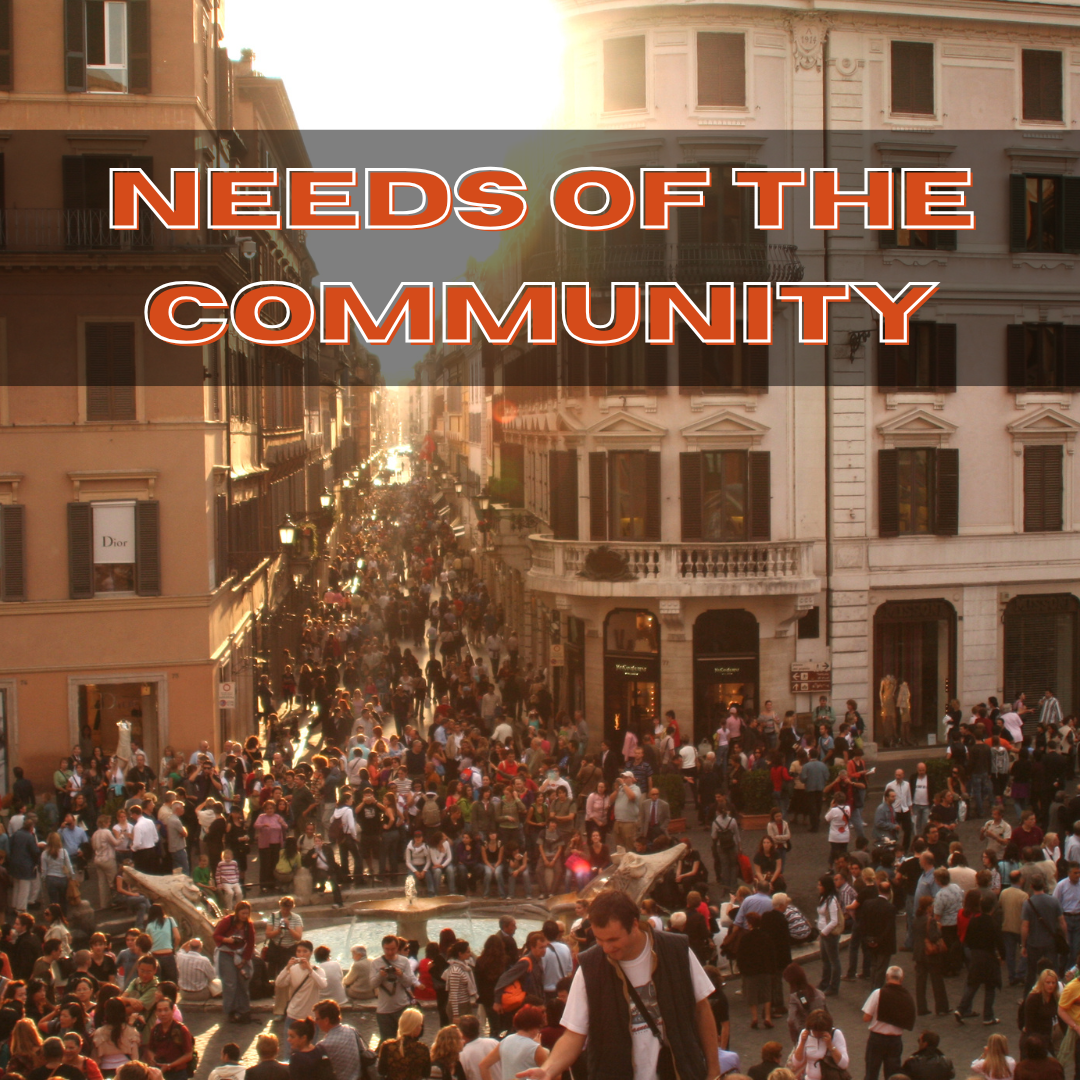
The Needs of the Community
The Needs of the Community: How Money Fuels Society’s Functions and Supports Our Collective Well-being
In every community, the flow of money plays a crucial role in ensuring the safety, health, prosperity, and overall well-being of its residents. From small local businesses to individual taxpayers, and from the smallest neighborhoods to the largest cities, financial contributions, in the form of taxes and investments, are at the heart of making societies function. When money circulates efficiently within a community, it fuels essential services like healthcare, infrastructure, education, job creation, and public safety, all of which create a safe, sustainable, and thriving environment for its people.
1. The Role of Money in Business and Economic Growth
At the heart of every community is its local economy, driven primarily by small and large businesses. Money earned by businesses circulates within the community, benefiting everyone involved. When businesses succeed, they create jobs, pay wages, and generate taxes, which in turn fund essential public services. The strength of a local economy impacts not only the employment rate but also the overall quality of life for residents.
Businesses provide a source of livelihood for families, encouraging financial stability, which leads to spending within the local economy. Local grocery stores, restaurants, service providers, and retail shops are examples of how business income trickles back into the community. This economic flow creates a cycle of prosperity where both businesses and individuals support each other.
In addition to employment, businesses also contribute to the development of infrastructure. Large corporations and small enterprises alike are often responsible for funding roads, public spaces, and local amenities through taxes. A thriving local business scene is a sign of a healthy economy, which can attract further investment, tourists, and entrepreneurs.
2. The Importance of Paying Taxes: Community Investment
Taxes are the backbone of government operations, and they represent a vital investment that individuals and businesses make in the community. Without taxes, essential public services like healthcare, law enforcement, education, and infrastructure maintenance would not be possible. While paying taxes may feel like a burden at times, it’s crucial to understand that these funds ensure the basic needs of the community are met.
Here are some key areas where taxes directly benefit the community:
-
Public Safety: Taxes fund law enforcement agencies, firefighters, emergency services, and national defense, all of which protect citizens from harm. These agencies ensure that crime rates are minimized, public spaces remain safe, and that emergency responses are swift and effective.
-
Healthcare: Public healthcare systems rely heavily on tax revenue to operate. Hospitals, clinics, and public health initiatives benefit from government funding to provide affordable or even free medical services to those in need. During pandemics or health crises, a well-funded healthcare system is crucial in saving lives and keeping the community safe.
-
Education: Taxes provide the financial foundation for public schools, libraries, and universities. They ensure that children and young adults receive quality education, setting the stage for future leaders and innovators. A well-educated population is a major asset for the community’s growth and future success.
-
Infrastructure: The roads we drive on, the bridges we cross, and the parks we visit are all maintained through tax revenue. Infrastructure, from transportation networks to communication systems, plays an essential role in the smooth functioning of any community. Without well-maintained infrastructure, economic activities would be hindered, leading to inefficiency and lower quality of life.
-
Social Services and Welfare: Taxes also fund social services such as unemployment benefits, housing assistance, and food programs. These services are critical in supporting the most vulnerable members of the community, ensuring that basic needs are met for all citizens, regardless of their financial situation.
3. The Government’s Role in Community Development
The government, funded by the taxes paid by both businesses and individuals, is responsible for using this money wisely to benefit the community. The government ensures that these resources are allocated to projects that improve public safety, promote health and wellness, and provide opportunities for citizens to thrive.
Public Safety and Protection
One of the primary roles of the government is to ensure the safety of its citizens. Taxes fund police departments, fire stations, disaster response teams, and national defense, all of which work to prevent crime, respond to emergencies, and protect the nation from external threats. The government also enforces laws that protect individual rights, property, and the community as a whole.
The stability created by these protective measures allows businesses to flourish and individuals to live in peace. Without government-led safety measures, communities would be vulnerable to crime and disorder.
Healthcare Access
Another critical area where the government plays a major role is healthcare. In most communities, public healthcare systems rely on funding from the government to ensure that citizens have access to medical care. This may include funding for hospitals, free medical clinics, immunization programs, mental health services, and pandemic response efforts.
Public health initiatives, such as sanitation and clean drinking water projects, are also the responsibility of the government. These efforts keep communities safe from health crises, improve overall life expectancy, and enhance quality of life.
Infrastructure and Job Creation
Investing in infrastructure is one of the government’s largest expenditures, but it is also one of the most impactful. High-quality roads, bridges, public transportation, and utilities provide the foundation for economic growth. When communities have the right infrastructure, they become more attractive to businesses and investors, which in turn creates jobs and promotes prosperity.
Government-funded construction and infrastructure projects often provide jobs to local residents, further boosting the economy. As infrastructure projects are completed, they lead to the development of new business districts, housing communities, and recreational areas, all of which contribute to the overall vitality of the region.
4. How Community Collaboration and Financial Contributions Benefit All
Money flows in a continuous loop between individuals, businesses, and governments. Each entity relies on the others to create a healthy, functioning community. Businesses need individuals to work and spend, individuals rely on businesses for income, and both rely on government services for protection, education, healthcare, and infrastructure.
When each part of this financial ecosystem contributes, the community as a whole benefits. Public investments made possible through taxes make it easier for businesses to thrive. At the same time, healthy businesses lead to more jobs, better infrastructure, and more tax revenue for future public projects. In this way, money serves as the lifeblood that keeps communities strong, resilient, and growing.
5. A Collective Responsibility: Ensuring Long-term Success
It’s essential to recognize that supporting the community is a collective responsibility. By paying taxes, shopping locally, and contributing to community efforts, individuals can play a role in shaping the future of their town or city. Likewise, businesses that contribute to their communities through local hiring, environmental initiatives, and ethical practices help create a more sustainable and prosperous environment for all.
By understanding the vital role money plays in keeping the wheels of the community turning—from funding healthcare and education to maintaining infrastructure and public safety—we can each do our part to ensure that our communities remain strong, healthy, and prepared for the future.
Conclusion
Money is more than just a means of exchange; it is the fuel that keeps communities functioning, safe, and thriving. Whether through business investments, individual spending, or taxes paid to the government, financial contributions are at the heart of every service and structure we rely on. By recognizing the importance of money in maintaining the needs of the community, we can work together to create stronger, more prosperous communities where everyone benefits. Whether we’re funding public safety, improving healthcare, building infrastructure, or supporting education, money works as a powerful force for good when channeled into the needs of the community.
